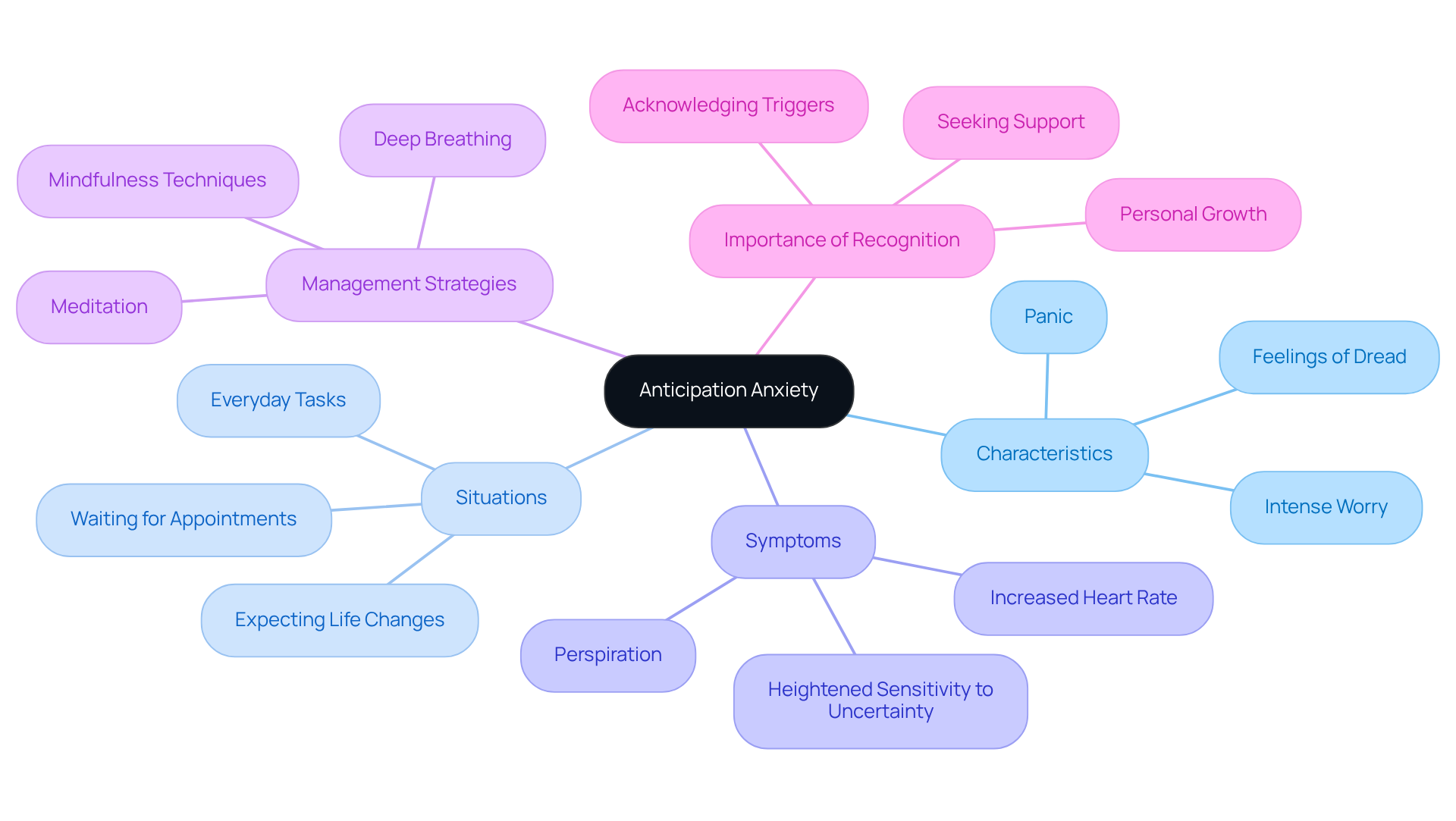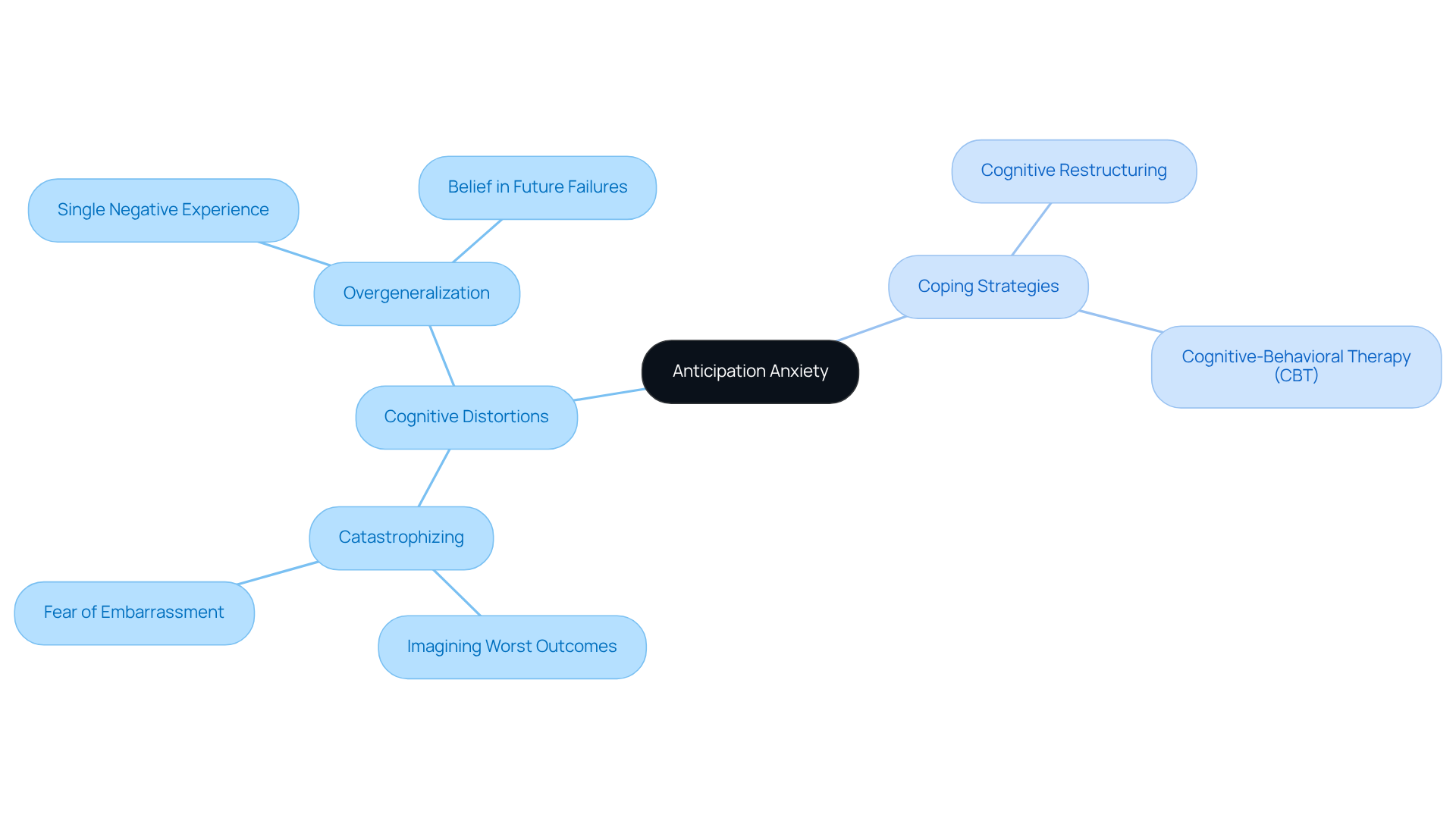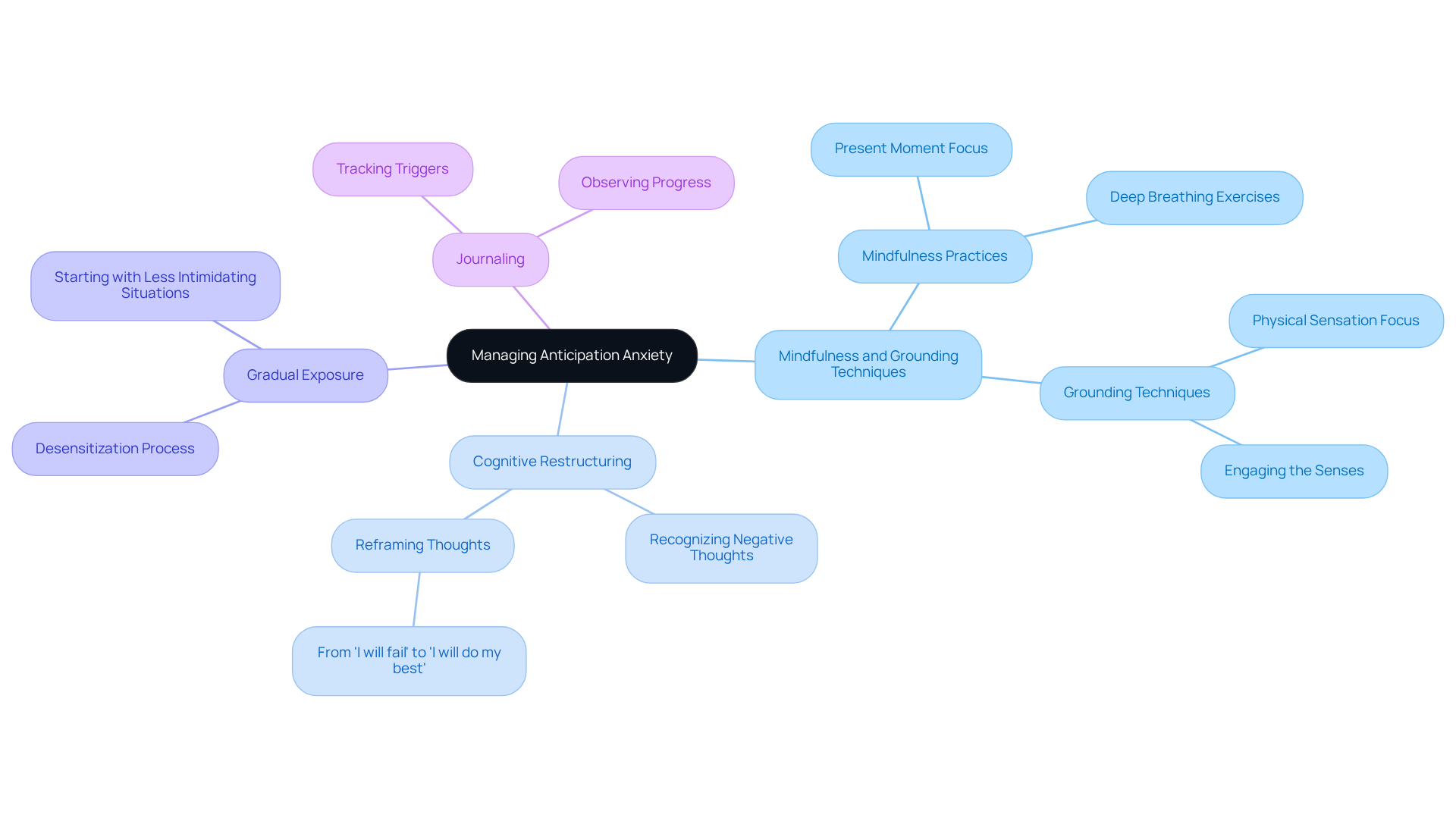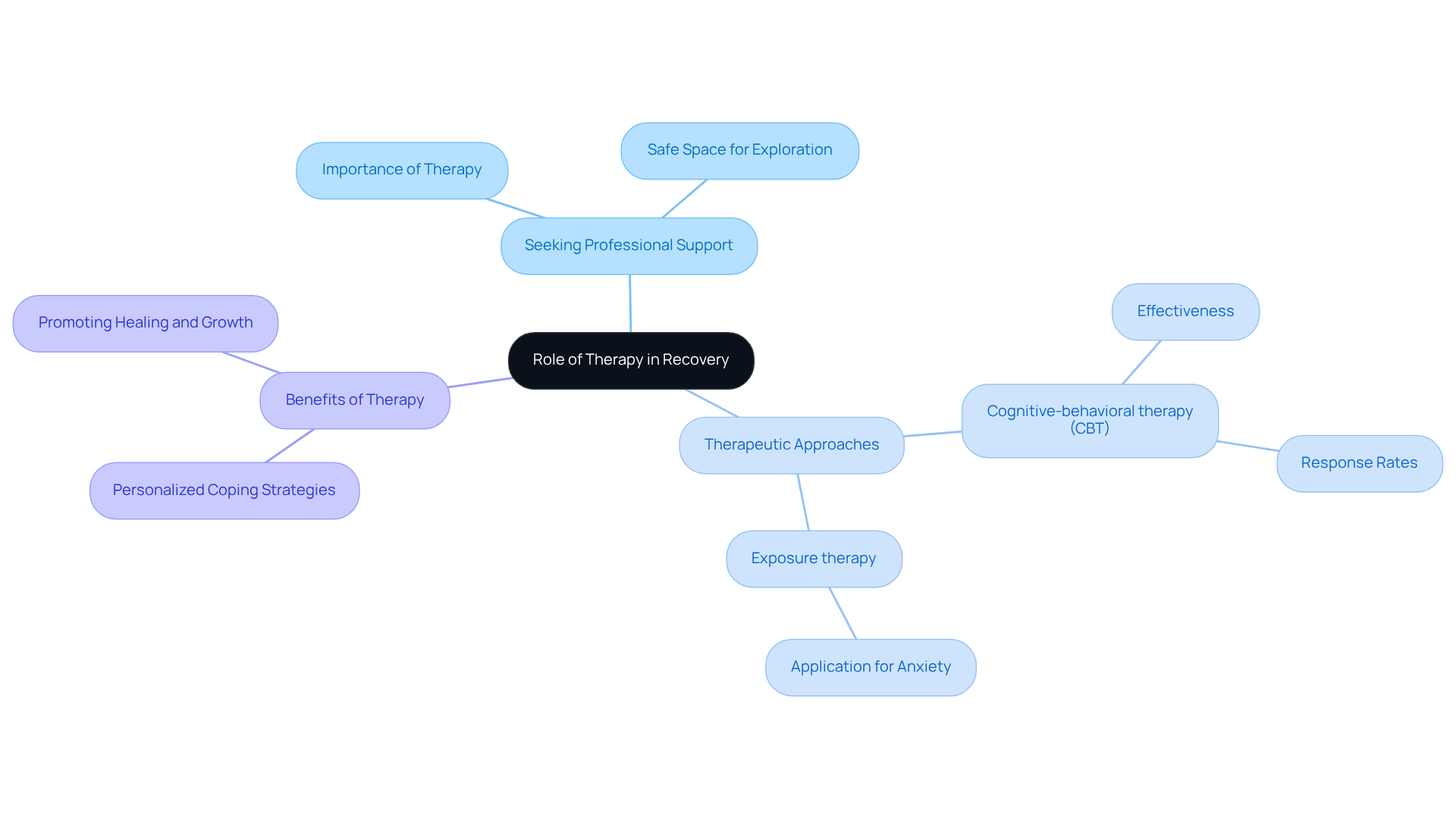Overview
Coping with anticipation anxiety can feel overwhelming, but there are compassionate strategies that can help.
- Mindfulness
- Cognitive restructuring
- Seeking professional support
These are effective ways to manage the stress that comes with uncertainty about the future. Have you ever felt anxious about what lies ahead? Understanding the cognitive roots of this anxiety is essential, as it allows us to address our emotions thoughtfully.
By utilizing practical methods, we can significantly enhance our emotional regulation and resilience. This journey towards better mental well-being is not just possible; it is within your reach. Remember, seeking support is a brave step towards healing, and you don’t have to navigate this path alone.
Introduction
Anticipation anxiety can cast a long shadow over even the most mundane of moments, triggering intense worry about future events and leaving individuals feeling paralyzed by uncertainty. Have you ever felt this way? This pervasive form of anxiety not only affects mental well-being but can also manifest physically, leading to symptoms such as increased heart rate and panic.
As we explore this further, the need for effective coping mechanisms becomes increasingly urgent. Individuals are invited to discover a variety of strategies that promise to mitigate these overwhelming feelings.
How can one transform the grip of anticipation anxiety into a pathway for growth and resilience? Together, let’s seek ways to navigate through this journey toward healing and understanding.
Define Anticipation Anxiety: Understanding the Concept
Anticipation anxiety is characterized by intense worry or fear about future events, often accompanied by feelings of dread or panic. This type of stress, referred to as anticipation anxiety, can arise in various situations, such as:
- Waiting for an important appointment
- Expecting significant life changes
- Everyday tasks
Have you ever felt overwhelmed by the uncertainty of what lies ahead? Recent research indicates that those experiencing anticipation anxiety may show symptoms like heightened sensitivity to uncertainty and physical signs such as increased heart rate or perspiration. For instance, studies have revealed that extreme reactions to uncertain threats can exacerbate stress levels, underscoring the importance of recognizing personal triggers. Mental health experts emphasize that acknowledging anticipation anxiety is a vital first step toward effective management. As Jennifer Elisabeth notes, understanding one’s feelings can pave the way for seeking support from loved ones. Furthermore, Thich Nhat Hanh encourages us to "smile, breathe, and go slowly," highlighting the significance of mindfulness in navigating stress.
At The Emerald Couch, we understand that the journey to wellness is unique for each person. Our personalized therapy solutions begin with an intake session, where we collaboratively develop a custom treatment plan tailored to your specific needs and goals. Most clients start to feel better or notice some improvement within 4 to 6 weeks, as we work together to establish a pace that feels right for you. We also offer virtual appointments for those who may need them.
Practical methods for managing expectation-related stress include mindfulness techniques, such as deep breathing and meditation, which have proven effective in alleviating symptoms. These empower individuals to take control of their stress triggers. Moreover, statistics reveal that stress-related disorders affect approximately 42.5 million U.S. adults, highlighting the critical need to address expectation-related stress within the broader context of mental well-being. By recognizing and addressing anticipation anxiety, individuals can explore coping strategies that foster resilience and enhance emotional health.

Explore the Cognitive Roots of Anticipation Anxiety
Anticipation anxiety often arises from cognitive distortions—irrational thought patterns that can heighten feelings of unease. Have you ever found yourself imagining the worst possible outcomes? This is known as catastrophizing, where individuals fixate on fears that lead to increased distress. For example, someone preparing for a job interview might experience anticipation anxiety by dwelling on the possibility of failing, envisioning scenarios where they embarrass themselves or face outright rejection.
Another common distortion is overgeneralization, where one negative experience, such as a poor performance in a previous interview, leads to the belief that all future interviews will end similarly. It's understandable to feel this way, but studies show that these cognitive patterns, such as anticipation anxiety, are not only common but also significantly influence stress levels. Research indicates that those with anxiety disorders often exhibit higher rates of cognitive distortions compared to others.
By acknowledging and confronting these cognitive origins, we can begin to reshape our thoughts and alleviate the weight of expectation-related stress. Methods like cognitive restructuring, an essential aspect of cognitive-behavioral therapy (CBT), empower individuals to replace distorted thoughts with more balanced perspectives. This journey promotes resilience and enhances overall , inviting you to take the first step towards healing.

Implement Coping Strategies: Managing Anticipation Anxiety
Managing anticipation anxiety may seem daunting, yet there are compassionate strategies you can adopt to enhance emotional regulation and resilience.
- Mindfulness and Grounding Techniques: Have you ever felt overwhelmed by the uncertainties of the future? Engaging in mindfulness practices can help you stay anchored in the present moment, significantly reducing the urge to dwell on what lies ahead. Grounding techniques, such as focusing on physical sensations or practicing deep breathing exercises, can serve as comforting tools to help you detach from anxious thoughts and reconnect with your immediate environment. Research shows that these practices can lead to substantial reductions in anxiety symptoms, with mindfulness demonstrating a moderate effect in enhancing overall well-being.
- Cognitive Restructuring: Consider the thoughts that race through your mind during stressful times. This strategy encourages you to recognize and challenge negative thought patterns. Instead of succumbing to the belief, 'I will fail,' try reframing it to, 'I will do my best, and that is enough.' This shift not only alleviates stress but also nurtures a more balanced perspective, fostering psychological flexibility.
- Gradual Exposure: Have you ever faced a situation that seemed too overwhelming? Gradual exposure to anxiety-inducing scenarios can gently desensitize your fear response. By starting with less intimidating situations and progressively confronting more challenging ones, you can build confidence and reduce your overall stress levels. Evidence supports this technique's effectiveness in managing various stress-related disorders.
- Journaling: Writing about your thoughts and feelings can be a and emotional processing. Journaling allows you to track triggers and observe your progress over time, helping you recognize patterns in your stress and develop personalized coping strategies.
By integrating these approaches into your daily life, you can more effectively manage anticipation anxiety related to expectations. This fosters a sense of control and enhances your overall mental well-being. Remember, seeking support is a courageous step towards healing.

Seek Professional Support: The Role of Therapy in Recovery
Seeking professional support is a crucial step for individuals grappling with anticipation anxiety. At The Emerald Couch, we understand the challenges you face and specialize in addressing trauma and stress, including PTSD, OCD, and phobias. Our safe space allows you to explore your feelings, identify triggers, and develop personalized coping strategies. Have you ever felt overwhelmed by your past? are here to assist you in recognizing the link between your experiences and present worries, promoting healing and growth.
We offer both face-to-face counseling and telehealth therapy options, ensuring you receive the support that best fits your needs. Various therapeutic approaches, such as:
- Cognitive-behavioral therapy (CBT)
- Exposure therapy
are particularly effective in addressing anticipation anxiety. By working with a qualified professional at The Emerald Couch, you can gain valuable insights and tools to manage your anxiety more effectively.
This is especially important for overachievers who may feel overwhelmed, anxious, or burnt out. We help you slow down and prioritize , allowing you to nurture yourself. Remember, seeking help is a sign of strength, and we are here to support you every step of the way.

Conclusion
Anticipation anxiety can significantly affect daily life, often presenting as overwhelming worry about future events. In this tutorial, we’ve explored the nature of this anxiety, highlighting the importance of recognizing its symptoms and triggers as the first step toward effective management. Understanding anticipation anxiety not only enhances personal awareness but also opens the door to various coping strategies that can nurture emotional resilience.
Have you ever felt overwhelmed by your worries about what lies ahead? Key insights discussed include the cognitive roots of anticipation anxiety, such as cognitive distortions like catastrophizing and overgeneralization. We’ve highlighted practical strategies for managing these feelings, including:
- Mindfulness techniques
- Cognitive restructuring
- Gradual exposure
- Journaling
All of which are effective methods for reducing stress and promoting well-being. Furthermore, the importance of seeking professional support, particularly through therapy, has been underscored as a vital resource for those struggling with anticipation anxiety.
Ultimately, addressing anticipation anxiety is crucial for enhancing mental health and overall quality of life. By implementing these strategies and seeking the right support, individuals can reclaim their sense of control and navigate the uncertainties of life with greater ease. Embracing the journey toward managing anticipation anxiety not only empowers you but also contributes to a healthier, more balanced approach to future challenges. Remember, you are not alone on this journey—support is available, and taking that first step can lead to profound change.
Frequently Asked Questions
What is anticipation anxiety?
Anticipation anxiety is characterized by intense worry or fear about future events, often accompanied by feelings of dread or panic.
In what situations can anticipation anxiety arise?
Anticipation anxiety can arise in various situations, such as waiting for an important appointment, expecting significant life changes, or during everyday tasks.
What are some symptoms of anticipation anxiety?
Symptoms of anticipation anxiety may include heightened sensitivity to uncertainty, increased heart rate, and perspiration.
Why is it important to recognize personal triggers for anticipation anxiety?
Recognizing personal triggers is important because extreme reactions to uncertain threats can exacerbate stress levels, making it crucial for effective management.
What steps can individuals take to manage anticipation anxiety?
Individuals can manage anticipation anxiety by acknowledging their feelings, seeking support from loved ones, and employing mindfulness techniques such as deep breathing and meditation.
How does The Emerald Couch approach therapy for anticipation anxiety?
The Emerald Couch offers personalized therapy solutions that begin with an intake session to collaboratively develop a custom treatment plan tailored to individual needs and goals.
How long does it typically take for clients to notice improvement in therapy?
Most clients start to feel better or notice some improvement within 4 to 6 weeks of beginning therapy.
Are virtual appointments available for managing anticipation anxiety?
Yes, The Emerald Couch offers virtual appointments for those who may need them.
What is the broader context of addressing anticipation anxiety in mental health?
Addressing anticipation anxiety is critical as stress-related disorders affect approximately 42.5 million U.S. adults, highlighting the need for effective coping strategies to foster resilience and enhance emotional health.




